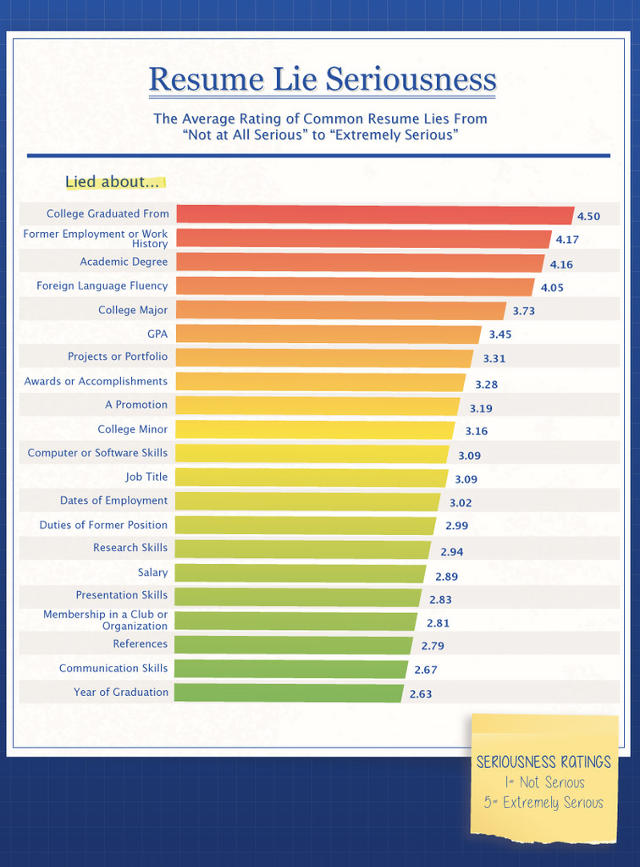Even in a market that favors job seekers, candidates will go to great lengths to clinch the job of their dreams. So it should come as no surprise that more than half (56%) of over 2,000 hiring managers have caught a lie on a resume, according to the most recent survey from CareerBuilder.
And those lies can understandably cost candidates the job. Another study of hiring managers revealed that the majority (69%) of them said that if they caught the candidate lying about something, it would be a deal breaker.
But that still leaves 31% of hiring managers who would be willing to look the other way. How far is too far, though? Hloom, an online provider of office templates for small businesses and individuals, surveyed 2,000 employed workers to see what they thought about the difference between “harmless white lies” and “serious falsehoods.”
Among the lies that most people labeled “real” were:
- College
- Foreign language fluency
- Academic degree
- Former employment history
Those ranked harmless included:
- Computer skills
- Year of graduation
- Duties in former position
- Promotions
These most common fibs were ranked on a scale of one to five, with five being the most serious.

The cause of the padding and exaggerations was overwhelmingly (49.3%) to appear more qualified for the desired job. Coming in second, 21.7% of those surveyed confessed they wanted to embellish their experience to come off as more well-rounded.
Most applicants think they can just get away with it, according to Carly Steele Johnson, a representative from the creative team at Hloom. “It is very easy for an employer to verify information, however, many of them are busy so wouldn’t always check,” she tells Fast Company, adding, “Who has time to check every little detail?”
If they were let go, the likelihood of lying on their resume increases. The New Norms @ Work global survey found that less than half (46.8%) of all workers polled said they would be totally honest about it if they had to reveal whether they got fired from a job. Twelve percent of full-time workers said if they got fired from a job, they would leave it off their CV or LinkedIn profile.
Those who were out of work and actively looking were most likely to tell a white lie, according to the Hloom survey. Unemployed workers who were not seeking employment were most likely to report that they’d tell a real lie.
Age doesn’t play in strongly as to whether or not the applicant will lie. Forty-three percent of the youngest respondents between the ages of 18-24 said they’d tell a white lie, while 48% of those between 55-64 said they would. That latter group also were the most likely to tell a real lie, as 12.7% reported they would.
Education does factor in to whether or not someone will fib. Sixty-eight percent of respondents who completed some high school but didn’t earn a diploma admitted to telling a white lie on a resume, and 38% of them told a real lie. In sharp contrast, no one with a doctorate degree confessed to telling a real lie, and only 13.6% reported white lies.
Gender separated the liars from the truth tellers. “Men told white lies almost 6% more than women, and real lies over 3% more than women,” Steele Johnson says. She could only speculate on the reasons why. “Perhaps since men are still very often the only full-time employee of their household, they feel more pressure to get the job?” she asks.
